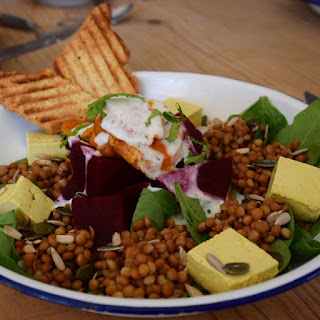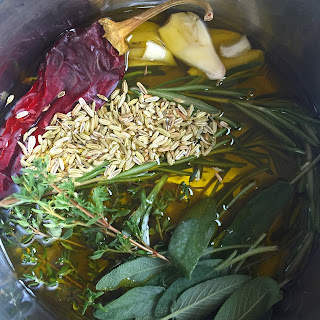A heart full of love
It's generally believed that individuals from the Mediterranean live longer and have a lower prevalence of cardiovascular disease than Americans, which is the premise of the Mediterranean diet.
Several studies have shown that adhering to a Mediterranean diet is effective for both primary and secondary prevention of cardiovascular disease. For example, PREDIMED, a randomized study of over 7,000 subjects showed a 30% relative risk reduction of cardiovascular events in high risk patients following a Mediterranean style diet.
Unlike other heart healthy diets such as Dietary Approach to Stop Hypertension (DASH) and Ornish diet, the Mediterranean diet lacks structure. Instead, as the name implies, it emulates Mediterranean style dietary patterns.
That sounds great in theory, but...
There is no one "Mediterranean diet"
Over twenty countries border the Mediterranean Sea...Italy, France, Egypt, Lebanon, Morocco, Turkey, Libya, Tunisia, etc. I've had the opportunity to explore several of these countries, each with unique traditions, rich culture, and of course, exceptional cuisines. Some of my favorites....
Israel (where my family is from by way of Libya) features salatim, a sort of catch all phrase for salads often served at the start of the meal. My favorite salatim include hummus (mashed chickpeas with tahini), Israeli salad (diced onions, cucumbers, and tomatoes with lemon juice and olive oil), baba ganoush (roasted eggplant), spicy carrot salad, and matbucha (North African spicy tomato and roasted peppers). Other popular ingredients are legumes, found in dishes such as ful (fava beans, olive oil and cumin) and mujadarah (rice and lentils); braised fish, such as chriameh; luscious yogurts and dairy, such as labne; and wonderful spices, such as za'atar and turmeric.
*Note, these dishes are popular in Israel, but originate from countries throughout the Middle East. So please, no heated debates :)
 |
| Presenting at European Society of Cardiology in London |
Several studies have shown that adhering to a Mediterranean diet is effective for both primary and secondary prevention of cardiovascular disease. For example, PREDIMED, a randomized study of over 7,000 subjects showed a 30% relative risk reduction of cardiovascular events in high risk patients following a Mediterranean style diet.
Unlike other heart healthy diets such as Dietary Approach to Stop Hypertension (DASH) and Ornish diet, the Mediterranean diet lacks structure. Instead, as the name implies, it emulates Mediterranean style dietary patterns.
That sounds great in theory, but...
There is no one "Mediterranean diet"
Over twenty countries border the Mediterranean Sea...Italy, France, Egypt, Lebanon, Morocco, Turkey, Libya, Tunisia, etc. I've had the opportunity to explore several of these countries, each with unique traditions, rich culture, and of course, exceptional cuisines. Some of my favorites....
Israel (where my family is from by way of Libya) features salatim, a sort of catch all phrase for salads often served at the start of the meal. My favorite salatim include hummus (mashed chickpeas with tahini), Israeli salad (diced onions, cucumbers, and tomatoes with lemon juice and olive oil), baba ganoush (roasted eggplant), spicy carrot salad, and matbucha (North African spicy tomato and roasted peppers). Other popular ingredients are legumes, found in dishes such as ful (fava beans, olive oil and cumin) and mujadarah (rice and lentils); braised fish, such as chriameh; luscious yogurts and dairy, such as labne; and wonderful spices, such as za'atar and turmeric.
*Note, these dishes are popular in Israel, but originate from countries throughout the Middle East. So please, no heated debates :)
|
|
|
Spain (home of some of my favorite culinary styles) is known for tapas, or small plates, which highlight local seafood, both raw and cooked; fresh vegetables, such as fried padron peppers, roasted mushrooms, and patatas bravas (diced potatoes with salsa); assorted olives; and many cured, stuffed, braised, and grilled meats. Other dishes famous to this region include paella (Valencian rice dish usually made with seafood or meat) and gazpacho (raw, cold vegetable soup, usually tomato based).
Greece stands out for its use of fresh (often locally grown), yet very simple ingredients. Beautiful and delicious olives and dairy products are popular. There is (Greek) yogurt at every stop and turn, which is usually served plainly with honey or fresh fruit. Other dietary staples include grilled fish drizzled with olive oil and lemon juice and meat served with tzatziki (strained yogurt with cucumbers).
|
|
|
The rules are, there ain't no rules
With so much variety, you may wonder how one can possibly follow a Mediterranean diet. First recognize that this is not a diet in the traditional sense. There are no stages or phases like Dukan or South Beach, no points system like Weight Watchers...Instead, the focus is on echoing the dietary patterns consumed by the countries bordering the Mediterranean Sea. And while each country has its own personality and flavors, there are broad dietary patterns that are shared throughout the region. This allows for flexibility and diversity of what you can eat, promoting a truly sustainable lifestyle rather than a fad diet.
The Mediterranean diet is great for those who crave delicious food and uncompromising flavor, but also want to eat well and stay healthy. In combination with portion control and exercise, a Mediterranean style diet can prevent cardiovascular disease and help maintain a healthy weight. On the other hand, because this diet forgoes rigid rules and caloric restrictions, it may not be the best first choice for those primarily trying to lose weight. This diet can also be somewhat costly given the emphasis on fresh produce, olive oil, nuts, and fish. But with savvy meal planning focused on seasonal, local (and "on sale") ingredients, the Mediterranean diet can fit any budget.
Fake it till you make it: Live like a Mediterranean
The Mediterranean mentality is all about moderation. It's a lifestyle not a diet. "Bad" foods are not demonized, but rather enjoyed occasionally. It's all give and take. Israel, for example, consumes eggs quite frequently. Shakshuka, poached egg in tomato sauce, is wildly popular there. Spain, on the other hand, is known for its pork and cured meats. Neither is particularly "heart healthy," and that's absolutely fine. What's more notable is that both countries eat an abundance of fresh fruits and vegetables, legumes, and whole grains. Gestalt is a German idea that the organized whole is perceived as more than the sum of its parts. In other words, it's the big picture that matters. There are no formal rules, instead there are some general principles.
Enjoy these foods daily (several times per day):
|
|
|
||||||
|
|
|
Legumes: Legumes are a type of fruit that usually grow as pods. Common legumes include dry beans, lentils, peanuts, chickpeas, soybeans, peas, and black-eyed peas. They tend to be high in fiber and protein, and low in fat. They're filling, nutritionally dense, versatile and delicious.
Nuts and seeds: Nuts and seeds are rich in good, monounsaturated fatty acids (MUFAs), such as linoleic acid. They are also a rich source of fiber and protein. Because of their fat content, though, they tend to be high in calories. A portion size is 1 ounce, which is about a handful.
Grains: The low carb craze gained its popularity in the 1990s, and as a result, grains have been somewhat minimized in North America. The Mediterranean diet, on the other hand, is rich in grains, particularly unprocessed wheat, barley, brown rice, oats, rye, and corn. Whole grains retain their nutritionally dense outer layer called bran, which is high in fiber, essential fatty acids, and protein.
Olive oil: Olive oil is the main source of fat for cooking. It should be used in place of saturated fats, such as butter and vegetable oil, whenever possible. Extra virgin olive oil (EVOO) is the richest in heart healthy MUFAs and antioxidants and is arguably the most characteristic staple of the Mediterranean diet. Not all olive oil is created equally, both taste wise and nutritionally. Find a brand of oil that is aromatic and flavorful and that you trust (Google to be sure it's truly made from olives) and stick with that brand. I use StoneHouse olive oil from California.
Herbs and Spices: Mediterranean cuisines are known for fresh herbs, such as parsley, mint, and basil. They're also known for bold spices, such as turmeric, cinnamon, saffron, cumin and caraway seeds. Adding flavor through herbs and spices is a good way to cut down on salt. Many of these spices are also excellent sources of antioxidants.
Enjoy these foods weekly (several times per week):
|
|
|
Poultry: Poultry, such as chicken and turkey are high in protein, but are leaner than red meats.
Dairy: Low fat Greek yogurt and cheeses are an excellent source of calcium, which promote both heart and bone health. Greek yogurt in particular is packed with protein, making it a great option for breakfast or a midday snack.
Eggs: Eggs are easy to make, delicious, and high in protein. They are filling and quite portable, so they make a great snack. However, they're high in cholesterol, so should be eaten in moderation.
Wine: (optional): I'm usually all about equal rights, but sorry ladies. Men may enjoy up to 2 glasses of wine per day and women 1 glass per day. Cheers. It's healthy.
Enjoy occasionally (special occasions/sparingly over a month):
 |
| Red Meat: Boeuf Bourguignon |
Don't forget...
Moderation. Moderation. Moderation! Also, exercise is a crucial component of the Mediterranean lifestyle.
Estruch R, Ros E, Salas-Salvadó J, Covas MI, Corella D, Arós F, Gómez-Gracia E, Ruiz-Gutiérrez V, Fiol M, Lapetra J, Lamuela-Raventos RM, Serra-Majem L, Pintó X, Basora J, Muñoz MA, Sorlí JV, Martínez JA, Martínez-González MA; PREDIMED Study Investigators. Primary prevention of cardiovascular disease with a Mediterranean diet. N Engl J Med. 2013 Apr 4;368(14):1279-90. doi: 10.1056/NEJMoa1200303. Epub 2013 Feb 25. Erratum in: N Engl J Med. 2014 Feb 27;370(9):886. PubMed PMID: 23432189.





















Great explanation of the Mediterranean diet! In our Madrid workshops, we teach how to make paella, tapas, and other traditional dishes that perfectly represent this healthy and flavorful lifestyle.
ReplyDeleteBest amazing blog i like it.
ReplyDeleteMantram Nursing Academy offers the best DHA coaching in Jalandhar, Punjab, designed explicitly for nurses aiming to pass the DHA exam on their first attempt. Our expert faculty simplifies complex topics, conducts mock tests, and utilises updated materials that match DHA standards. We focus on personalised mentoring to build confidence and address doubts. Choose Mantram’s coaching in Jalandhar to receive thorough, focused preparation and take the next step toward a rewarding nursing career in Dubai.
ReplyDeleteBest DHA Coaching in Jalandhar, Punjab
Thanks for such a great post and then review, Biotin Hair Shampoo
ReplyDelete